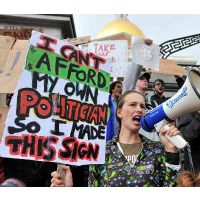Uber Lobbying in California Tops Walmart and Big Banks

Is the 6-year-old startup Uber worth its $40-billion valuation by investors if the San Francisco-based company has to treat its “independent contractors” like employees and give ride data to government regulators?
Probably not, which is one reason why the company is willing to pay for an army of lobbyists in California larger than that mustered by Walmart, Bank of American and Wells Fargo combined, according to the Los Angeles Times. Uber has paid lobbyists 10 times more in 2015 than the limousine industry and four times more than the taxi industry.
The company spent 10 times more money ($474,182) on lobbying in the state capital during three months in the summer of 2014 than it spent in any prior three-month period. Lawmakers were considering how to make the company do proper background checks and carry enough insurance.
A judge with the state Public Utilities Commission (PUC) ruled earlier this month that Uber should pay a $7.3-million fine and be suspended because it had not provided required ride data. That was about a month after the California Labor Commissioner ruled in a case with statewide implications that an Uber driver was an employee, not a contractor, and entitled to certain benefits and reimbursements.
But neither of those battles is nearly over, replicating encounters across the country. Every other day, it seems, there is a story about some municipality, state or nation cracking down on the ride-sharing company that claims to be just a computer app, not a transportation company subject to government oversight. Many people miss the follow-up stories, similar to the experiences in Virginia and Portland.
The Department of Motor Vehicles (DMV) in the Old Dominion State declared Uber illegal and ordered them to shut down in June 2014. But the decision was put on hold by Virginia’s Department of Transportation secretary when the governor indicated he would be meeting with Uber lobbyists in the coming days, according to the Washington Post. Uber then crafted a proposed temporary operating permit that state officials adopted, with revisions.
Portland, whose not-out-of-character communitarian embrace of Airbnb marked it as an early enthusiast for the sharing economy, was skittish about letting Uber in the city and was slow to regulate it. In short order, Uber built a network in areas surrounding the city and then one day last December simply announced it was doing business in Portland.
Portland sued to stop them. The compromise reached in January—a short pause by Uber while a task force hammered out an agreement—opened the door to Uber’s lobbying squad. By February, Portland’s director of strategic initiatives, Josh Alpert, was telling Bloomberg:
“They kinda run this. I keep feeling they will just wear you down. If we end up in court, we will have to lose just based on resources.”
The city council OK’d a four-month trial run for Uber in April, while the company and its lobbyists help the city craft final regulations.
There were no Uber registered lobbyists in Oregon in 2013. The company employed 14 last year and has 28 there now. Bloomberg said Uber had contracts with lobbyists valued at between $420,000 and $945,000.
Uber’s California contracts were valued at $684,000. That could grow.
–Ken Broder
To Learn More:
Facing Regulatory Roadblocks, Uber Ramps up Its Lobbying in California (by Chris Kirkham and Tracey Lien, Los Angeles Times)
This Is How Uber Takes Over a City (by Karen Weise, Bloomberg)
Uber Has an Army of at Least 161 Lobbyists and They're Crushing Regulators (by T.C. Sottek, The Verge)
Uber Pressures Regulators by Mobilizing Riders and Hiring Vast Lobbying Network (by Rosalind S. Helderman, Washington Post)
Sharing-Economy on Alert: Uber Driver Declared Employee, not a Contractor (by Ken Broder, AllGov California)
- Top Stories
- Controversies
- Where is the Money Going?
- California and the Nation
- Appointments and Resignations
- Unusual News
- Latest News
- California Forbids U.S. Immigration Agents from Pretending to be Police
- California Lawmakers Urged to Strip “Self-Dealing” Tax Board of Its Duties
- Big Oil’s Grip on California
- Santa Cruz Police See Homeland Security Betrayal in Use of Gang Roundup as Cover for Immigration Raid
- Oil Companies Face Deadline to Stop Polluting California Groundwater





